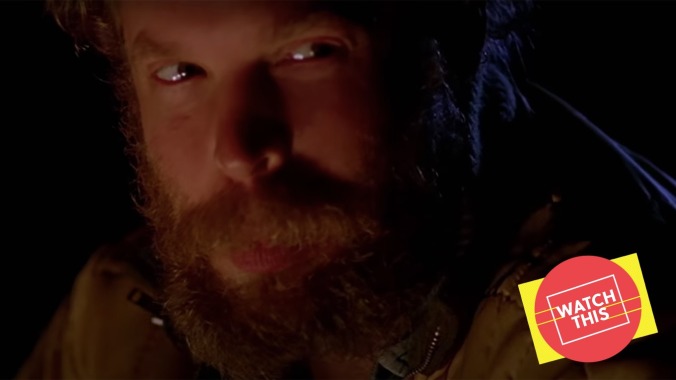Kelly Reichardt is the modern master of the short story adaptation

Watch This offers movie recommendations inspired by new releases, premieres, current events, or occasionally just our own inscrutable whims. This week: Antlers, a horror movie adapted from a story by Nick Antosca, is not hitting theaters. In its absence, we’re looking back on other movies based on short stories.
Old Joy (2006)
In Kelly Reichardt’s Old Joy, two estranged friends embark on a camping trip to the Cascade Mountains. Mark (Daniel London) is settled down, a husband who’s soon to be a father. Kurt (Will Oldham, a.k.a. the singer-songwriter Bonnie “Prince” Billy) is a bohemian rolling stone—a nomad bouncing all over the country, from one failed venture to the next. The two were once close but have grown apart, separated by a distance more than geographic. Over the course of a day and some change, they’ll take a long drive, shoot cans and the shit, knock back a few beers—prototypical male-bonding stuff. Only once does the tension in their strained relationship come up in dialogue. Yet it’s the subtext of every scene, the unacknowledged animating force of their reunion.
It should come as no surprise that Old Joy was pulled from the pages of a short story. It possesses qualities often associated with the form: a condensed narrative; vivid details of character and environment; an embrace of ambiguity and inconclusiveness. These are hallmarks of Reichardt’s whole filmography. Has any modern master filmmaker turned more frequently and fruitfully to short fiction for inspiration? Even when not adapted from bite-sized source material (like the vignettes in Certain Women, all based on tales from a Maile Meloy collection), her films feel like they were. They’re profoundly “small”—at once compact and open-ended, precise in the (mostly Oregonian) milieus they study but also amenable to multiple interpretations.
Old Joy was the film that put Reichardt on a lot of cinephiles’ maps. It was her first collaboration with the writer Jonathan Raymond, who’s co-scripted five of her features (including the recent First Cow, which supplies his novel The Half Life with the brevity and texture of a short story). Adapted from the opening tale in Raymond’s Livability—a collection the director would return to with her next feature, Wendy And Lucy—the film is faithful in incident but not necessarily approach: The drama plays a little different on screen than it did on page, where events unfolded from Mark’s first-person perspective, offering a running commentary on every minute shift in the central dynamic.
Without the benefit of prose and its clarifying capacity, the movie provides a narrower window into the characters’ thoughts. While Old Joy subtly privileges Mark’s vantage on events (partially by opening with him getting a phone call from Kurt, who we don’t see until the next scene), there’s no internal monologue guiding us through the emotional minefield of this scenario. Reichardt instead trusts her actors to convey the conflicts—a gamble that paid off, especially in the casting of Oldham, who terrifically telegraphs Kurt’s vulnerability but also the deficit of self-awareness that potentially chipped away at his friendship with Mark. There’s more dialogue and yet, paradoxically, more remains unsaid: We’re left to infer the great “something” that’s come between these two men—or maybe to search for clues to it in the gorgeous Pacific Northwest landscape Reichardt captures from the inside of a moving vehicle.
Many filmmakers use short stories as blueprints, building something larger from them. But Old Joy doesn’t really expand on “Old Joy.” It preserves not just the spirit but also the essential minimalism of Mark and Kurt’s understated odyssey. The additions are to the margins and not the meat of the plot: Giving one of these old friends a pregnant wife underscores the disparity in lifestyle that’s opened up between them. The film also adopts a sonic framing device absent from Raymond’s story: snippets of talk radio about the Democratic party’s failure to speak to the American working class—an element that felt timely in the wake of Bush’s reelection and feels rather prescient now, and one that links the movie’s quietly implied desperation and economic uncertainty to the political conscience that runs through all of the filmmaker’s work. Yet Old Joy doesn’t spell anything out—least of all, the nuances of how a friendship can slowly dissolve over the years. Like lots of great short stories, it leaves mysteries and meanings in the space between the words, straight through to a climactic gesture of intimacy less notable for its suggestive implications than the bittersweet desire for connection it fleetingly communicates.
Availability: Old Joy is available to stream on The Criterion Channel.